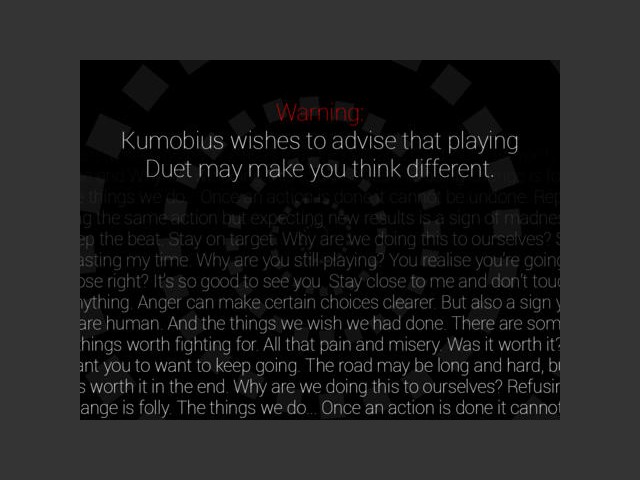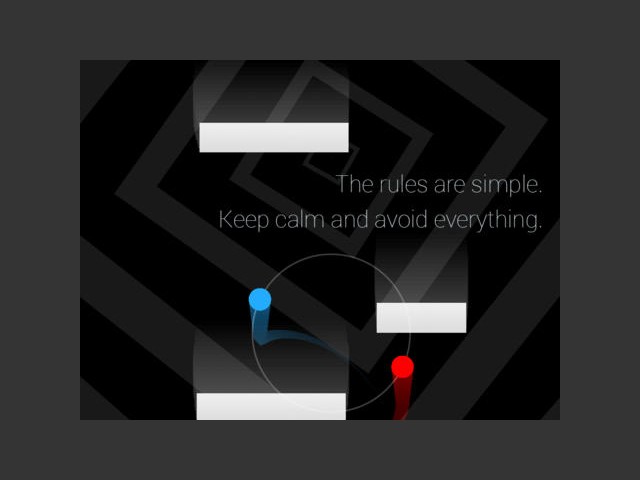This duet is pretty to listen to, frustrating to play.
Duet is the port of a 2013 mobile title where you control two dots, one red, one blue, on the opposite sides of a circle. You can rotate them around the circle left or right, and have to avoid either of them hitting a series of falling white blocks. If one of your dots hits a white block, it splatters it with the color and you have to restart from the beginning of the level. Apart from that, at the beginning of each level platitudes about the five stages of grief appear. That's about as simple as I describe Duet.
Duet is the best when you are in the flow, when the shapes come down and you intuitively know when to turn, in what direction, and one after another you maneuver through obstacles. It's exhilarating to clear a section that has been giving you trouble, only to navigate through the rest of a level knowing exactly what to do, and making it through the end by the skin of your teeth, just narrowly missing the last few blocks. However, this is not the majority of the gaming experience, which is screwing up, and then having to play the entire level over, and over, and over, often frustratingly messing up on sections earlier that you easily cleared before.
Duet's greatest issues are its strengths as a mobile title, particularly the way the game is designed for short bursts of play around where it can be set down while performing other tasks. One of the game's greatest assets is its soundtrack, an up-tempo, hypnotic electronic trance mix of casual beats, piano, and tones. However, it and the pulsing falling blocks and elements in the background can lure the player into a false sense of syncopation that would be perfect if Duet were a rhythm game, but movement in the game often is asynchronous from these elements. This means the longer you play while messing up, the more the music mesmerizes; the more likely you are to mess up, as you will be more likely to try to change directions on the beat, which isn't when the change is necessary.
Another issue is the movement. A quick mouse click moves the circles one twelfth of a full rotation. What that means is that your dots don't stop when you stop pressing, but will move whatever the rest of that length is before stopping, and even pressing in the opposite direction will not stop them from completing that twelfth of a movement, meaning you will occasionally smash into walls while trying desperately to reverse course. None of this would be so bad if smashing into a wall didn't immediately take you back to the beginning of the level, where you will often screw up because you're focused on the pattern of the last few moves, not those at the beginning of the level.
Again, all of this makes sense for a title designed for mobile, where control issues are a little more variable, and you would expect to take time off from playing after failing a few times to do something else, then come back to the game later. Elements like the lack of a save mid-level or the pulses to the beat of the music make sense, because on mobile that confusion increases difficulty and player challenge, but is unlikely to totally frustrate players due to shorter play times.
However, a home desktop experience is different; it's designed for continuous play and precision, lacking those capabilities turns Duet into a recipe for frustration. Duet also immediately launches you into the start of the level you died, instead of giving you the choice of a restart, so it's hard to rest your eyes and defocus before moving on.
Duet is a solid game if you play it exactly as you might a mobile title, taking frequent breaks so the game doesn't mesmerize you into its lull of increased artificial difficulty. However, having to make that caveat, on a title that is being released for a PC desktop, feels hollow and poorly implemented. Part of the task of porting a game is to produce a version on the platform that works within the structures of that platform.

To put it more plainly, one of the screenshots for Duet is a warning from the company that reads, "Warning: Kumobius wishes to advise you that playing Duet may make you think different." It's true, but not in the way that they meant, which I believe was to promote a kind of meditative experience—which I have had with games like the pixel-art walking simulator Proteus. No, what I experienced instead was a not-infrequent fury that a game could so thoroughly botch precision controls, while trolling you with a presentation designed to lull you into a meditative state, then punishing you for not being able to focus on precise tasks, over and over and over again.
-
A great arcade gaming concept
-
Mobile controls lack PC precision
-
Mesmerizing elements distract from gameplay
-
Excellent soundtrack
-
Mobile implementation ports poorly to a desktop experience











